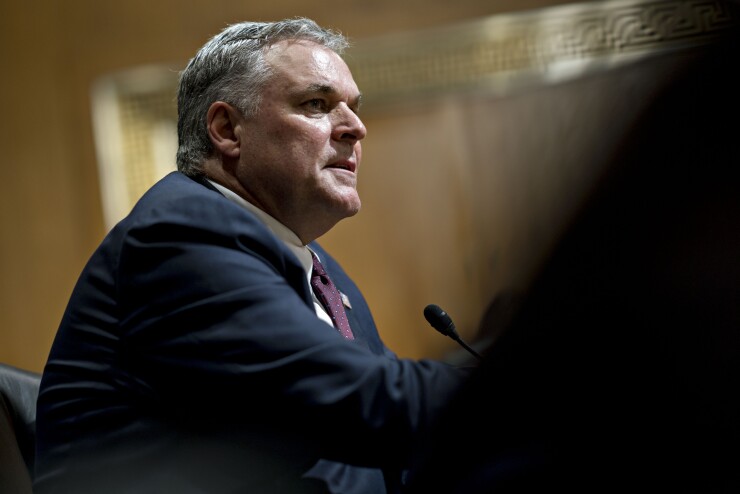The Senate voted Wednesday to approve the nomination of Beverly Hills tax attorney Charles "Chuck" Rettig as commissioner of the Internal Revenue Service.
Rettig, who has been with the firm of Hochman, Salkin, Rettig, Toscher & Perez for 35 years, will be expected to help the IRS deal with the impact of the Tax Cuts and Jobs Act, including a large number of new tax forms and schedules and demand for guidance on various aspects of the hastily drafted tax law, even as the IRS struggles with flat budgets and diminished staffing.
He will be succeeding John Koskinen, whose term ended last November. In the interim, Assistant Secretary of the Treasury for Tax Policy David Kautter has been doing double duty as acting commissioner.

Rettig was originally nominated by Trump in February, but he didn’t have his confirmation hearing until June. The Senate Finance Committee voted to advance his nomination in July by a closely divided vote of 14-13. The full Senate voted to confirm him by a 64-33 vote on Wednesday.
Sen. Rob Portman, R-Ohio, was among those who voted to confirm Rettig both in the Finance Committee and in the full Senate. “Charles Rettig has the right qualifications and experience necessary to lead the IRS effectively and I am pleased he was confirmed today by the Senate,” he said in a statement Wednesday. “It has been 20 years since the last significant IRS reform, and it is time to update the agency once again. Rettig’s support for a fully functioning IRS Oversight Board and a reinforced right to an independent appeal further justifies the need to move the bipartisan IRS reform legislation that I introduced with Sen. [Ben] Cardin [D-Maryland], the Protecting Taxpayers Act. We have an opportunity ahead of us to make the IRS more responsive and accountable to the needs of taxpayers and help restore Americans’ faith in this agency, and I look forward to working with the new commissioner on this effort and other important issues.”
Rettig may also be dealing with a second phase of tax reform that House Republicans hope to pass this month, extending the individual tax cuts in the Tax Cuts and Jobs Act beyond 2025. However the legislation isn’t expect to pass in the Senate, where Democrats would be needed to vote in favor of it.
Portman and Cardin's legislation, however, does have bipartisan support, though. The Protecting Taxpayers Act aims to reform a number of IRS functions and administrative practices in order to make the agency more responsive and accountable to taxpayers. The bill is designed to revitalize the IRS organizational structure and management; increase taxpayer protections and modernize enforcement procedures; improve small business and retirement plan tax administration; better serve low-income taxpayers; overhaul the IRS appeals process; and strengthen the agency's IT infrastructure.
Similar legislation has already advanced in the House. House Ways and Means Committee Chairman Kevin Brady, R-Texas, voiced his support for Rettig. “I want to congratulate Chuck Rettig on his successful confirmation,” he said in a statement. “Getting a permanent commissioner in that seat is imperative to ensure our new Tax Code is administered fairly and effectively. Americans’ faith in the IRS over the years has vanished, and for good reason.Riddled with scandals, the agency abused its power and lost sight of its mission of providing taxpayers with quality service. As we continue to work with the Senate on our package of bold reforms to redesign the IRS, Mr. Rettig is just the partner we need to transform the agency to one that truly puts taxpayers first.”
Senate Finance Committee Chairman Orrin Hatch, R-Utah, applauded Rettig’s confirmation and blamed Democrats for holding up the process. “With the biggest tax overhaul in a generation on the books, it’s about time that the agency charged with administering our nation’s tax laws has a confirmed commissioner,” Hatch said. “From implementing tax reform so that Americans continue to benefit from increased growth, job creation and wages to restoring trust in an agency complicated by scandal and mistrust, Chuck has his work cut out for him. But he has proven that he is qualified and ready for the challenge. Often, I hear our friends on the other side of the aisle profess the need for efficient and competent tax administration, but their hold on Rettig’s nomination for purely political purposes flies in the face of that. The Democrats’ reasons for not supporting Rettig’s nomination were unreasonable. I am pleased that the Senate was able to act on Rettig’s nomination despite these baseless objections.”
Democrats had largely opposed Rettig's confirmation in response to a Trump administration policy that allows some groups involved in politics to hide the identity of their donors.
Sen. Ron Wyden, D-Oregon, the ranking Democrat on the Senate Finance Committee also blamed the Republicans for pushing through a tax law that punished so-called blue states led by Democrats by limiting state and local tax deductions.
“From the very beginning, the Trump tax law was all about giving the biggest possible handout to corporations and the mega-wealthy,” said Wyden. “And in the process, to hide the massive scale of those handouts, the Trump administration and their Republican allies in Congress hit blue states like Oregon, California, New Jersey and others with a gut punch, capping the state and local tax deduction. To target people in Oregon and elsewhere in this way is wrong. It reveals the rotten core of the Trump tax law. ... As for this week, I urge my colleagues to oppose the Rettig nomination. And I look forward to working with my colleagues to fix this dark money crisis and undo the damage the Trump tax law has brought on.”





